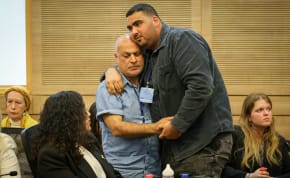According to police data, 141 elected officials are currently designated as "threatened."
The families called to liberate the hostages before Passover, the holiday of freedom.
An inside look into what occurs when the Knesset goes into spring recess.
The Knesset could convene during the recess under certain circumstances and is likely to do so, but the governing coalition refused requests by the opposition to completely cancel the break.
Likud MK Tally Gotliv performed the famous Israeli tune made popular in the 1930s, attacking Arab MKs.
Despite debates over anti-government protests, true unity comes with accepting opinions different than ours and the right of free speech and protest.
Gantz stopped short of saying he would leave the government if the prime minister did not accept his demand.
Netanyahu, who is recovering from surgery, said he will act immediately to close Al Jazeera according to the procedure laid out in the law.
"This is not a protest, it is a struggle. We are fighting to get them back, and we will not remain silent," said Danny Elgarat, the brother of Gaza hostage Itzhak Elgarat.
Begin Road was blocked in both directions by the Pink Front as part of the demonstrations.











